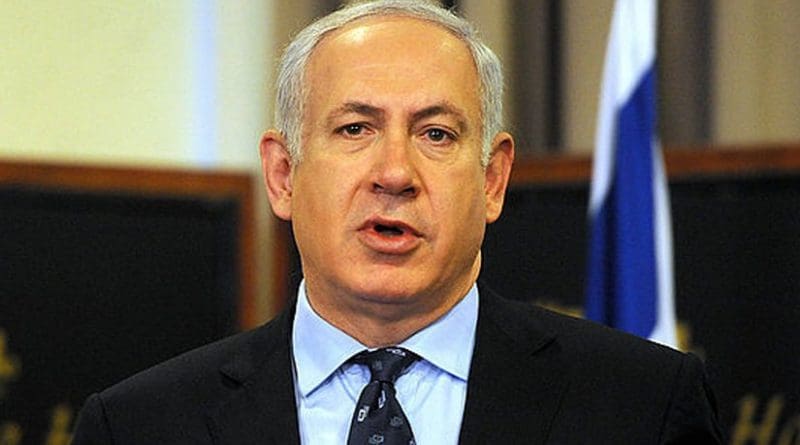The Hefty Price Of Netanyahu’s Victory – OpEd
As much as Benjamin Netanyahu’s landslide victory in the legislative elections last week was bad news for the Palestinians and the rest of the world, it was probably a much-needed wake-up call for those who still believed in a two-state solution.
His victory underlined the fact that the Israeli society is leaning heavily to the right and the far right, as evident from election results.
The right camp won 67 seats, compared to 39 seats the left and centrist parties grabbed.
Netanyahu’s anti-Arab rhetoric and his pledge not to allow the creation of a Palestinian state gave him an edge over far right and religious parties.
Had the Zionist Union defeated Netanyahu, as most opinion polls predicted, the Palestinians would have wasted another four years clinging to false hopes over a political settlement.
With the peace process dead and buried, it will be pointless for the Americans to try to convince Netanyahu to return to the negotiating table.
The two-state solution is behind us now and the Palestinians will have to brace themselves for four difficult years ahead.
The narrow right-wing government that Netanyahu promised to form will almost certainly double its efforts to Judaise East Jerusalem, fatten and build new settlements in the West Bank and challenge Jordan’s authority over Al Aqsa Mosque.
And with the Obama presidency nearing its end, the Israeli prime minister knows that he will not be challenged or stopped in his tracks.
Reports that US President Barack Obama is considering backing a UN resolution “embodying the principles of a two-state solution that would include Israel’s 1967 borders with Palestine and mutually agreed swaps of territory” are unlikely to be taken seriously.
Obama has tried to stand up to Netanyahu before and failed.
Even if these reports are true, Obama will face criticism from his own party, not to mention the Republicans, for abandoning Israel.
And even if such resolution is adopted, it will hardly force Netanyahu to change his course.
One thing is clear: Israel will be increasingly isolated if it turns its back to the peace process and ignores its friends and allies in the West.
Netanyahu cannot afford to anger Israel’s friends at a time when the international community is close to sealing a deal with Iran over Tehran’s nuclear programme.
Therefore, it is still possible that Netanyahu may opt to form a coalition government with the Zionist Union, if only to give the impression that Israel is still engaged in a political process with the Palestinians.
Bringing in Isaac Herzog and Tzipi Livni will definitely improve Netanyahu’s image abroad and may even prolong the life of his historic fourth term. Such a government will be welcomed by Washington and other Western capitals.
But the Palestinians must not be taken by such manoeuvres.
There are no major ideological differences between Netanyahu and Livni, and the Zionist Union’s stand on Jerusalem and West Bank settlements is close to that of the Likud.
Herzog has ignored the subject of peace talks with the Palestinians during his campaign, concentrating instead on economic issues.
The message from the Israeli electorate is loud and clear.
Fewer Israelis today back a political settlement based on UN resolutions and the original Oslo Accords.
Palestinian President Mahmoud Abbas knows this after more than 20 years of futile negotiations.
His options are limited, but he must not back down from putting diplomatic pressure on Israel in international forums.
Expecting support from the White House at this juncture will be a waste of time.
In addition, Arab countries can do little to help the Palestinians.
The Arab world is facing unprecedented crises in Iraq, Syria, Yemen and Libya. Gulf states are more worried about the growing Iranian threat and the possible change of US policy on the Middle East.
The fact is Abbas has fewer allies today as Palestinians face the most crucial existential challenge in their struggle for self-determination.
The most reliable support will come from his own people, and for him to secure this, he must end his rift with Hamas and bolster national reconciliation.
With the failure of peace talks with Israel, he must now prepare his people for the worst.
His message to the Israeli public should point to the fact that with the collapse of the two-state solution, Netanyahu’s unilateral policies will lead to one inevitable outcome: a bi-national state, a view recently echoed by Livni as well.
Certainly Netanyahu’s bid to pass a law recognising Israel as a Jewish state will do more harm than good to Israel’s future.
Netanyahu had always claimed that Israel had no Palestinian partner to negotiate with. But his stunning victory confirms the opposite: Israelis have no interest in negotiating a historic end to their conflict with the Palestinians.
The price for this will be paid by both.
The writer is a journalist and political commentator based in Amman.

